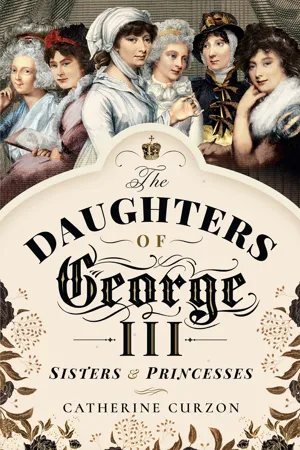
- 208 pages
- English
- ePUB (mobile friendly)
- Available on iOS & Android
About This Book
An in-depth look into the lives of the six daughters of King George III of England. In the dying years of the 18th century, the corridors of Windsor echoed to the footsteps of six princesses. They were Charlotte, Augusta, Elizabeth, Mary, Sophia, and Amelia, the daughters of King George III and Queen Charlotte of Mecklenburg-Strelitz. Though more than fifteen years divided the births of the eldest sister from the youngest, these princesses all shared a longing for escape. Faced with their father's illness and their mother's dominance, for all but one a life away from the seclusion of the royal household seemed like an unobtainable dream. The six daughters of George III were raised to be young ladies and each in her time was one of the most eligible women in the world. Tutored in the arts of royal womanhood, they were trained from infancy in the skills vital to a regal wife but as the king's illness ravaged him, husbands and opportunities slipped away. Yet even in isolation, the lives of the princesses were filled with incident. From secret romances to dashing equerries, rumors of pregnancy, clandestine marriage and even a run-in with Napoleon, each princess was the leading lady in her own story, whether tragic or inspirational. In The Daughters of George III, take a wander through the hallways of the royal palaces, where the king's endless ravings echo deep into the night and his daughters strive to be recognized not just as princesses, but as women too. Praise for The Daughters of George III "This fascinating look at the lives and times of the six daughters of George III and Queen Charlotte delivers an engaging read for enthusiasts of the royals and British history." — Library Journal
Frequently asked questions
Information
Endnotes
Table of contents
- Cover
- Dedication
- Title
- Copyright
- Contents
- Illustrations
- Acknowledgements
- Introduction
- Meet the Children
- Act One: A King, A Queen, and a Family of Fifteen
- Act Two: Charlotte, Princess Royal (29 September 1766 – 5 October 1828)
- Act Three: Princess Augusta Sophia of the United Kingdom (8 November 1768 – 22 September 1840)
- Act Four: Princess Elizabeth of the United Kingdom (22 May 1770 – 10 January 1840)
- Act Five: Princess Mary, Duchess of Gloucester and Edinburgh (25 April 1776 – 30 April 1857)
- Act Six: Princess Sophia of the United Kingdom (3 November 1777 – 27 May 1848)
- Act Seven: Princess Amelia of the United Kingdom (7 August 1783 – 2 November 1810)
- Afterword
- Bibliography
- Endnotes
- Plate Section